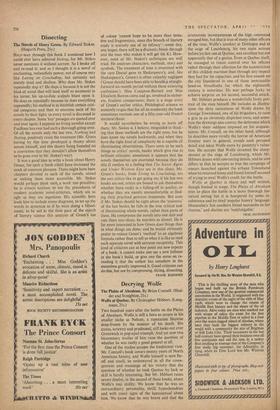Dissecting
The Novels of Henry Green. By Edward Stokes. (Hogarth Press, 21s.)
HALF-WAY through this book I wondered how I could ever have admired Doting, for Mr. Stokes never mentions it without sorrow. So I broke off and re-read it; and as 1 thought it is a novel of enchanting, melancholy power, not of course very like Loving or Concluding, but certainly not merely tired and shallow. Why does Mr. Stokes repeatedly slap it? He slaps it because it is not the kind of novel that will lend itself to treatment in his terms; his up-to-date scalpels blunt upon it. He does so repeatedly because he does everything repeatedly; his method is to establish certain criti- cal categories and then to examine each of the novels by their light; so every novel is discussed in every chapter. Some 'key' passages are quoted over and over again. I suppose 'no living novelist except Faulkner has ever had such a thorough going-over. Of all the novels only the last two, Nothing .and Doting, positively resist the treatment (Mr. Green having by this time developed a theory about novels himself, and this theory being founded on a conviction that they shouldn't allow themselves to be gone over in Mr. Stokes's way).
It was a good idea to write a book about Henry Green; for such a book could have increased the stock of common pleasure. There might have been chapters devoted to each of the novels, aimed at making them more accessible. Mr. Stokes would perhaps think such a work too primitive; he is always anxious to use the procedures of modern academic novel-criticism, which are as ugly as they are ingenious. His scientific bent leads him to include many diagrams, to tot up the words in sentences as if he were doing a blOod- count, to be sad at the slow pace of the march of literary science (his analysis of Green's use of colour 'cannot hope to be more than tenta- tive and fragmentary, since this branch of literary
study is scarcely out of its infancy'—some day, one hopes, there will be a dramatic break-through and the man who makes it will get his K). How-
ever, most, of Mr. Stokes's techniques are well
tried. He analyses characters, methods, story and symbols. The treatment of time is examined with the care Daniel gave to Shakespeare's, and, like Shakespeare's, Green's is often culpably negligent (`Green should have been able to handle? straight- forward six-month period without these annoying confusions'). Miss Compton-Burnett and Miss Elizabeth Bowen come and go, involved in elabor- ate, fruitless comparisons; there is a stage army of Green's earlier critics. Philological science so austerely reigns that for all its modernity the book sometimes reminds one of a fifty-year-old French doctoral thesis.
It would nevertheless be wrong to leave off there; Mr. Stokes is, I believe, misguided in think- ing that these methods are the right ones, but he does know the novels backwards, and when they have the right kind of complexity he is capable of illuminating observations. There seem to be such things as critics' novels, books which give rise to brilliant criticism; sometimes it appears that the novels themselves are overrated because they do this (I confess to a feeling that The Secret Agent and Under Western Eyes are in this class). Mr. Green's books, from Living to Concluding, are the sort critics like to get going on; if his last two books are not, critics are bound to ask themselves whether there really is a falling-off in quality, or whether they are merely uncomfortable at find- ing their practised gestures inapposite. But even if Mr. Stokes should be right about the 'staleness' of the last books, he fails in the true critical task of illuminating whole novels, rather than parts of them. He compresses the novels into one slab and cuts them into slices; he murders to dissect. He is far more interested in how Green does things than in what things are done; and he would obviously prefer to reduce Green's 'method' to an algebraic formula rather than to tell us what it is like to read each separate novel with extreme receptivity. This kind of criticism can at best point out new aspects of a book; it cannot make one see a new fullness in the book's build, or give one the sense on re- reading it that the author has somehow in the meantime greatly improved it. Good criticism can do this, but not by compressing, slicing, dissecting. FRANK KERMODE


































 Previous page
Previous page